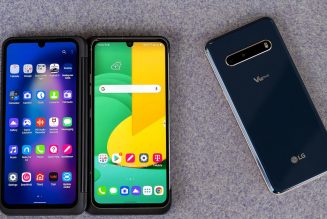
Epic Games launched its courtroom war against Apple in an extremely on-brand way: with CEO Tim Sweeney describing the metaverse from Neal Stephenson’s novel Snow Crash.
It’s “a real-time, computer-powered 3D entertainment and social medium in which real people would go into a 3D simulation together and have experiences of all sorts,” Sweeney explained to a courtroom partitioned by plastic barriers and a series of teleconferencing hotlines.
The metaverse is Sweeney’s chosen metaphor for Fortnite, the battle royale game that Apple banned from its iOS App Store last year. Epic sued in retaliation, and today, both companies delivered opening statements before Judge Yvonne Gonzalez Rogers. Epic put Sweeney on the stand for hours of exhaustively detailed questions about — among other things — Epic’s Unreal Engine, gaming consoles, the App Store, and what players do on Fortnite’s party island. Along the way, Sweeney positioned Fortnite as something much bigger than a simple video game: it’s “a phenomenon that transcends gaming,” he told the court. And in Epic’s narrative, Apple is unfairly demanding a cut of its profits.
While Sweeney has referred to Epic’s fight with Apple as a “fireworks show,” today’s session wasn’t quite as dramatic as that suggests. Sweeney is a generally soft-spoken man who delivered testimony through a barely audible microphone setup after a long troubleshooting period that involved random teenagers yelling “free Fortnite!” into accidentally unmuted conference lines. Epic’s legal team was responsible for asking questions that set up Sweeney’s statements, resulting in queries both extremely tailored (“How would you define the metaverse?”) and comically general (“Are you familiar with something called a ‘console’?”)
More generally, Apple and Epic were holding battle lines that they drew months ago. “Developers found themselves caught in a trap of Apple’s making,” Epic argued in its opening statement, and “the most prevalent flower in the walled garden was the Venus Flytrap.” Apple countered by calling Epic’s suit “a fundamental assault on Apple’s secure and integrated ecosystem.” In cross-examination, Apple’s attorney pushed Sweeney to confirm that Epic spent nearly a decade playing by Apple’s rules before launching an operation codenamed “Project Liberty” to flout them. Both sides promoted high-minded ideals (freedom for Epic, security for Apple) and appeared shocked — shocked — that their opponent was trying to make money.
But hearing the arguments laid out helped clarify which tactics seem most likely to stick. Epic and Apple frame Epic’s demands very differently. Epic mostly stuck to discussing its most moderate request: that Apple let developers process in-app purchases through their own systems, bypassing Apple’s fee. Apple highlighted the most extreme ask: that Apple let iPhone owners side-load third-party app stores like the Epic Games Store. The former would be a big hit to Apple’s profits. The latter would transform iOS and poses security concerns that are much easier for Apple to lay out. (These are separate demands, so Judge Rogers could end up finding both parties’ arguments here compelling.)
Apple’s attorney didn’t finish cross-examining Sweeney on Monday. But he hammered on Epic’s willingness to deal with gaming companies like Sony, who lock down their consoles in ways that Apple compares to the iPhone. Sony, for instance, requires Epic to pay if a user plays Fortnite mostly on PlayStation but spends lots of money on another platform like PC. But Epic hasn’t complained about that deal.
On the other side, Epic can point to an intuitive sense that the iPhone platform is bigger and more all-encompassing than the Xbox or PlayStation. But Sweeney and its attorneys have drawn a much finer distinction involving its business model, saying that console makers typically sell their hardware at a loss, so they have an incentive to treat developers better.
Judge Rogers actively questioned that distinction during today’s testimony. “Apple did have to do something to the iPhone itself in terms of the technology of the iPhone in order for it to be sophisticated enough to play your software,” she said. “How is that any different than consoles — not so much about the payment piece, but about the development of the technology that allows your product to be played?”
This trial is about the entire App Store model, and as witnesses from Apple begin taking the stand, that will become more clear. Epic will grill them about Apple’s business practices and whether it’s delivering on its promise of a safe, secure experience for developers and iOS users. But Sweeney neatly laid out a more personal vision of the conflict: Fortnite is Epic’s answer to the web, and Apple wants 30 cents of every virtual dollar that an iPhone user spends in it.









